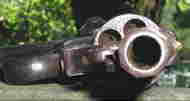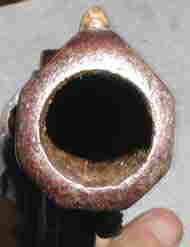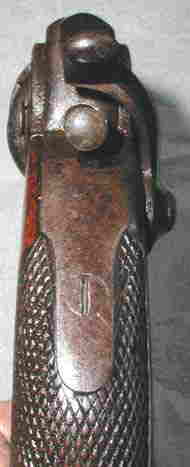|
|
||||||
|
|
||||||
|
|
||||||
|
During the American Civil War, The London Armory Company (LAC) acted
somewhat as official armorers for the Confederacy. They supplied
high quality interchangeable Enfield rifles and the rugged Kerr
revolver. They also were the unofficial London headquarters for
Confederate Army and Navy officers. After the opening days of the
Civil War there is no evidence whatsoever that any of their products
went to supply the North. Caleb Huse and Confederate Navy Captain
James D. Bullock, both primary buyers of Confederate arms dealt
extensively with this company. The LAC produced over 10,000 Kerr
revolvers but the exact amount ultimately imported into the South
is unknown. While it is generally found that pistols marked with
the "JS" over an anchor were of Confederate usage it cannot be proposed
that the absence of it precludes a Confederate heritage. It is simply
not known if all were so marked. However, the following pistol does
bear such a marking.
|
||||||
|
|
||||||
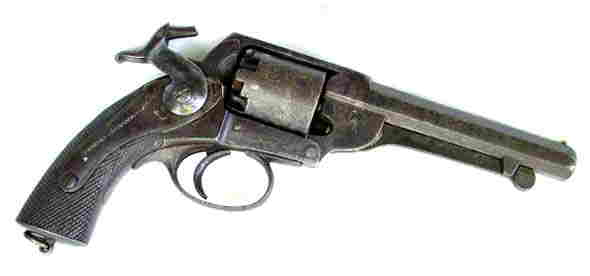
|
||||||
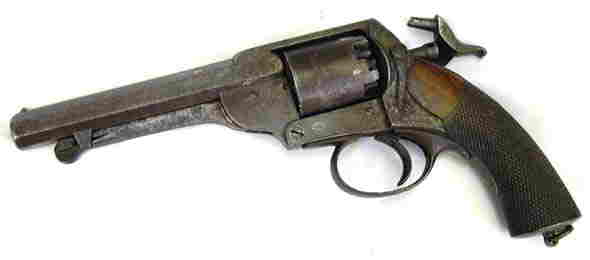
RIGHT AND LEFT SIDE VIEWS OF A LONDON ARMORY KERR REVOLVER WITH A JS ANCHOR STAMPING
|
||||||
|
The pictured arm is a 5 shot, 54 bore (.45 caliber) single action
weapon with English proof marks. It is stamped on the left upper
flat of the irregular octagonal* barrel with a small "L.A.C." forward
of a crown over an enjoined "GP" ( a London proof mark of the Gunmakers'
Company) and a crown over a "V" ( London viewers' mark). On the
left lower frame to the rear of the lower front frame screw is a
small oval stamping of "LONDON ARMORY". The lock plate is engraved
"LONDON ARMORY Co.". On the lower right side of the frame is an
engraved "KERR'S PATENT No. 6227". The same number is engraved on
the cylinder. Both of the previous engravings are difficult to see
on the pictured gun. This is thought to be a mark of final acceptance
as it was engraved only after all polishing immediately before bluing.
It is not the serial number of the gun. The actual serial number,
"471" of the gun is stamped on the front face of the cylinder (hardly
visible on the pictured arm), on the frame flat below the cylinder
where it is preceded by the letter "F", under the barrel strap over
the cylinder (all but gone) and the inside bow of the trigger guard.
|
||||||
|
It is also stated, by Williams, to be "in the handle in the lock
mortising". I did not take this arm apart that far to check that
location. The cylinder is also stamped to the rear, between chambers,
with 5 London proof stampings . 3 are the crown over "V" markings
and 2 are crown over "GP" markings. One more stamping, which some
consider more important than the rest, is found in the wood of the
stock just below the rear trigger guard strap. This is the approximately
1/8" high "JS" letters over a 3/16"+/- anchor.
|
||||||
| *
The top flat is a narrow viewing plane of 1/8" width. The upper
right and left flats are 3/8" wide while the lower right and left
flats are 1/4" in width with a 9/32" wide bottom flat.
|
||||||
|
|
||||||
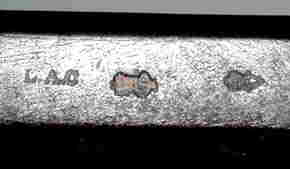
"L.A.C."
& PROOF STAMPINGS
|
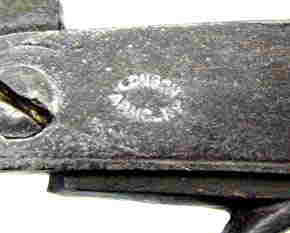
"LONDON
/ ARMORY" STAMPING
|
|||||
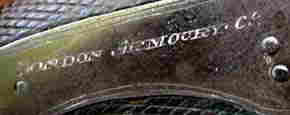
"LONDON
ARMORY Co."
|
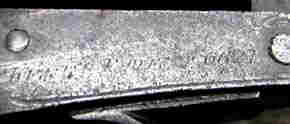
"KERR'S
PATENT No. 6227"
|
|||||
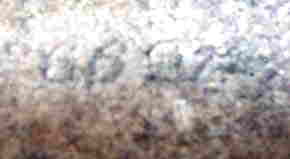
"6627"
|
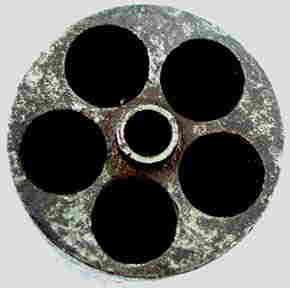
FRONT
OF CYLINDER
|
|||||
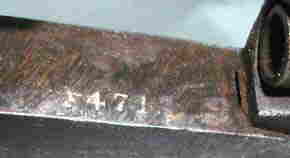
SERIAL
NO. "F471"
|
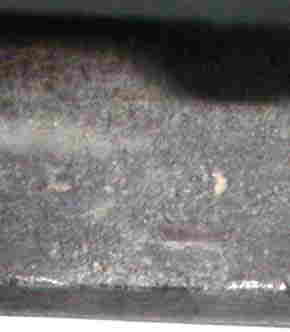
BOTTOM
OF TOP STRAP
|
|||||
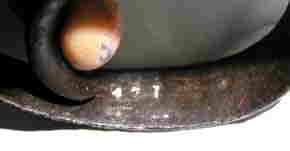
SERIAL
NO. "471"
|
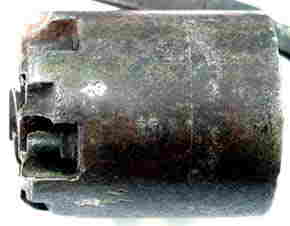
CYLINDER PROOFS
|
|||||
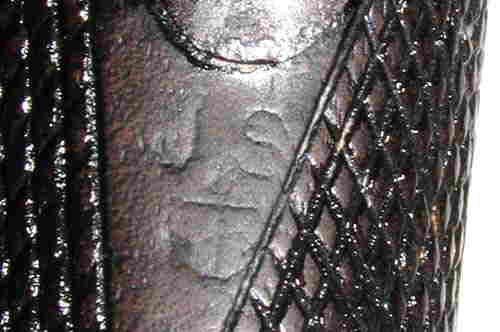
"JS
ANCHOR" STAMP
|
||||||
|
|
||||||
|
The Kerr revolver is 12-1/4" over all with a barrel length of 5-3/16".
The back action lock plate is 3-7/8". There is a rather large imposing
side hammer that curves over the frame to the center of the barrel.
The integral firing pin is 5/8" long. All metal parts are blued.
The grips appear to be checkered English walnut. The metal butt
plate is held in place by 2 screws. It has a lanyard swivel ring
attached. There is a external side spring behind the recoil shield
on the left side. This spring retains the back entering cylinder
pin in place. The spring must be pulled away from the gun to allow
for the removal of the cylinder pin and cylinder. When repositioning
the cylinder pin, it must be turned as to line up it's spring retaining
hole with the retaining spring. There is a hole though the end of
the cylinder pin to facilitate it's removal. The 1/8" thick flat
webbed ramrod is 4-13/16" long. It has a knurled rounded end with
a retaining spring on the left side for securing it between two
ears attached to the bottom barrel flat. The top strap has a "W"
shaped notch at the rear to allow for lining up the sighting with
the German silver front cone sight. Various views of these features
follow:
|
||||||
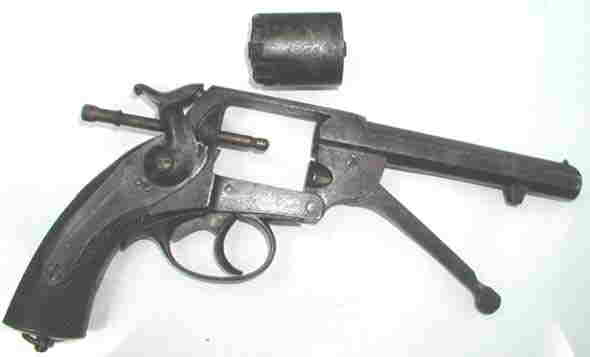
VIEW OF KERR REVOLVER WITH CYLINDER REMOVED
|
||||||

TOP REAR VIEW OF HAMMER
|

TOP VIEW OF BARREL
|
|||||
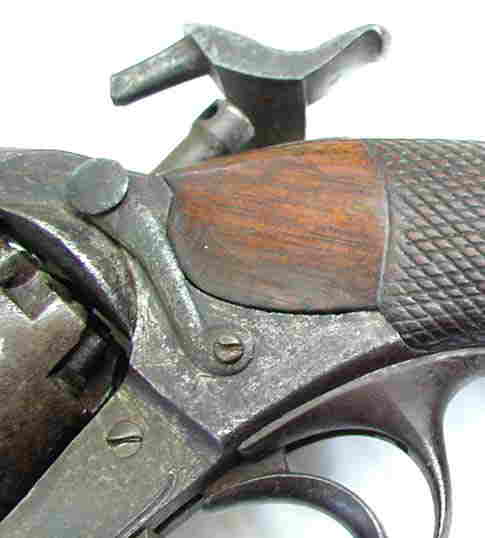
VIEW OF EXTERIOR CYLINDER PIN RETAINING SPRING AND FIRING PIN
|
||||||
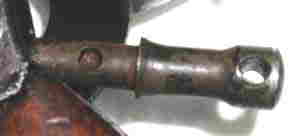
CYLINDER PIN VIEW SHOWING HOLE THROUGH PIN AND RETENTION HOLE FOR EXTERNAL RETAINING SPRING
|
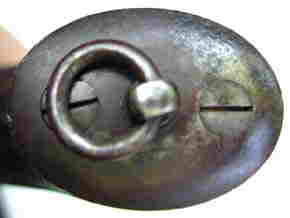
VIEW OF BUTT PLATE AND LANYARD SWIVEL RING
|
|||||

BOTTOM VIEW OF KERR REVOLVER
|
||||||
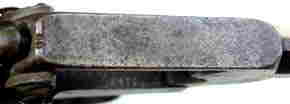
VIEW OF TOP STRAP AND REAR SIGHT
|
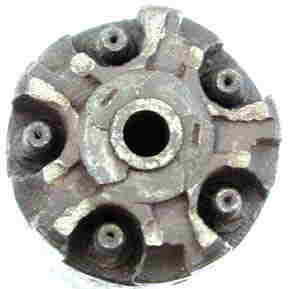
REAR VIEW OF CYLINDER
|
|||||
|
||||||
|
|
||||||
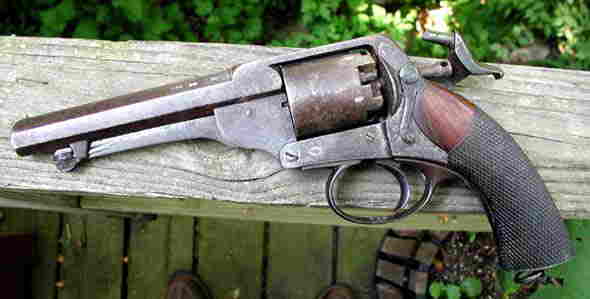
|
||||||
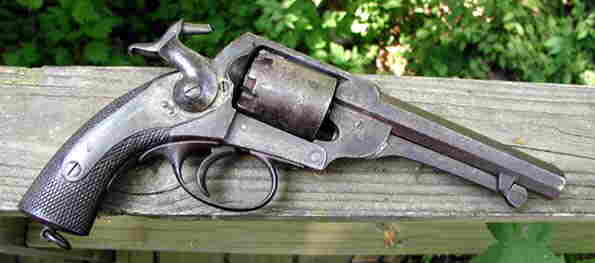
A COUPLE OF NICE OUTSIDE VIEWS OF THE KERR REVOLVER
|
||||||
|
|
||||||
|
Credits for information used in this posting should go to William
Edwards and his great book "CIVIL WAR GUNS", and to William A. Albaugh,
III, Hugh Benet, Jr. and Edward N. Simmons for their extremely informative
book, "CONFEDERATE HANDGUNS". These are extremely important books
for both the advanced and novice collector. Without them we would
just be gatherers rather than studiers and keepers of historic and
important firearms. This posting is in their honor.
|
||||||
|
Another person, my son, Reed Radcliffe is to be credited as the
Web Master for this page. Without him I could not bring this information
and photographs to you, the viewer.
|
||||||
|
It may be several days before another posting is made. There will
be more. Check back often. Thanks for visiting with us.
|
||||||
| Dave Radcliffe | ||||||
